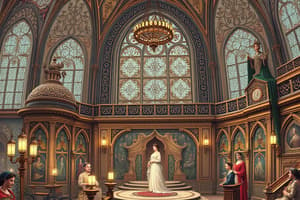Podcast
Questions and Answers
What is essential for a nuanced interpretation of historical events?
What is essential for a nuanced interpretation of historical events?
- Focusing solely on political factors
- Avoiding subjective interpretations
- Using only primary sources from the time period
- Understanding social, economic, political, and cultural factors (correct)
What challenge is commonly faced in the study of history?
What challenge is commonly faced in the study of history?
- Objective interpretation of historical events
- High availability of primary sources
- Documenting current events accurately
- Reconstructing experiences of marginalized groups (correct)
How does studying history help in understanding current events?
How does studying history help in understanding current events?
- By revealing social media patterns
- By predicting future technological advancements
- By analyzing patterns and connections between past and present (correct)
- By providing information on economic forecasts
What does the subjective interpretation of historical events imply?
What does the subjective interpretation of historical events imply?
What is a benefit of studying history according to the content?
What is a benefit of studying history according to the content?
What marked a pivotal turning point in human history?
What marked a pivotal turning point in human history?
Which of the following features is characteristic of early civilizations?
Which of the following features is characteristic of early civilizations?
What type of source do historians primarily use to analyze past events?
What type of source do historians primarily use to analyze past events?
What process do historians undertake when evaluating historical sources?
What process do historians undertake when evaluating historical sources?
How do oral traditions contribute to historical knowledge?
How do oral traditions contribute to historical knowledge?
In what way do significant historical developments impact society?
In what way do significant historical developments impact society?
What is a critical thinking aspect that historians must practice?
What is a critical thinking aspect that historians must practice?
Which of the following best describes the role of archaeological evidence in history?
Which of the following best describes the role of archaeological evidence in history?
Flashcards
Historical Interpretation
Historical Interpretation
Examining historical events through different lenses, like social, economic, political, and cultural factors, to gain a deeper understanding.
History's Relevance to the Present
History's Relevance to the Present
The process of understanding how events in the past can help us understand and address current challenges.
Challenges of Historical Study
Challenges of Historical Study
Understanding the limitations and biases present in historical sources.
Critical Thinking in History
Critical Thinking in History
Signup and view all the flashcards
History's Impact on Decisions
History's Impact on Decisions
Signup and view all the flashcards
Agriculture's impact
Agriculture's impact
Signup and view all the flashcards
Civilization key features
Civilization key features
Signup and view all the flashcards
Significant historical developments
Significant historical developments
Signup and view all the flashcards
Primary sources
Primary sources
Signup and view all the flashcards
Secondary sources
Secondary sources
Signup and view all the flashcards
Historical analysis
Historical analysis
Signup and view all the flashcards
Evolving history
Evolving history
Signup and view all the flashcards
Historical research process
Historical research process
Signup and view all the flashcards
Study Notes
Historical Periods
- History encompasses all past events, including human actions, social development, cultural evolution, and world shaping processes.
- Historical periods are defined by unique characteristics, ideas, events, and outcomes, often categorized by significant transitions in civilizations, technology, or social structures.
- Studying historical periods reveals societal evolution, adaptation, and interaction over time.
Key Historical Developments
- Agricultural development was a pivotal turning point, transitioning humans from nomadic hunting to settled farming, impacting population growth, social organization, and technological advancement.
- Civilizations emerged with complex social structures, political systems, and economic networks, featuring cities, centralized governments, specialized labor, and advancements in art and technology.
- Major religious movements, technological revolutions, political uprisings and global conflicts significantly shaped contemporary society.
Sources of Historical Knowledge
- Historians use various sources including primary sources (letters, diaries, artifacts) and secondary sources (books, articles) to reconstruct and interpret the past.
- Archaeological evidence illuminates pre-written record cultures and societies.
- Oral traditions and cultural practices transmit knowledge across generations.
- Visual sources (paintings, photographs) provide insights into past events.
Historical Methodology
- Historians use research and critical thinking to analyze and interpret historical sources.
- Historical analysis evaluates the context, biases, and reliability of sources.
- Historians continually refine interpretations as evidence and understanding evolve.
- Historical research rigorously examines evidence, considers diverse viewpoints, acknowledging knowledge limitations.
Historical Interpretation
- Historians utilize theoretical frameworks to analyze historical events from varied perspectives.
- Understanding social, economic, political, and cultural contexts is crucial for accurate historical interpretation.
- Studying history helps understand current events by identifying patterns and connections between past and present.
- Historical analysis provides a deeper understanding of human experience, motivations, and social structures over time.
Challenges in Historical Study
- Accessing primary sources, especially from earlier periods, is often difficult.
- Documenting the experiences of marginalized groups is challenging due to limited records.
- Historians' viewpoints can influence interpretations of historical events.
- Historical accounts often reflect the biases and priorities of the period they were created in.
Impact of Studying History
- History provides insights into human behavior and event causes and effects.
- Historical knowledge aids in understanding and addressing current global challenges.
- Studying history cultivates critical thinking and appreciation for diverse perspectives.
- Understanding the human past empowers informed decisions for the present and future.
Studying That Suits You
Use AI to generate personalized quizzes and flashcards to suit your learning preferences.




